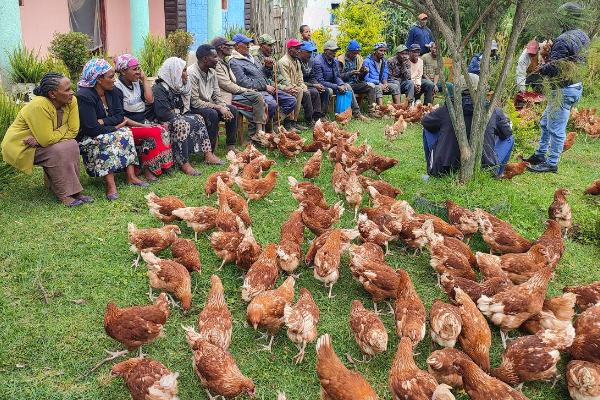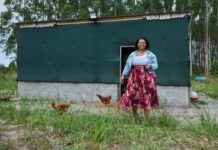A hands-on training method is empowering 3.2 million Ethiopian farmers to improve food production and nutrition security by equipping the smallholders with practical knowledge that turns poultry farming into a reliable source of income and food.
The training offered by the Livestock Farmers Field School uses demonstrations and peer learning. Farmers handle day-old chicks, practice disease control, and share experiences that strengthen confidence and skills.
Driven by Ethiopia’s Livestock and Fisheries Sector Development Project (LFSDP) drives this transformation, the project combines training, livestock inputs, veterinary services, and market access to boost productivity.
For many farmers, poultry farming was once risky and poorly organized. Today, guided support ensures families benefit from sustainable income, diversified diets, and stronger community resilience.
One striking example is Imran Abba Jihad, a youth from Oromia who joined the Kena Poultry Cooperative. He received day-old chicks, a modern poultry house, equipment, and matching grants through LFSDP.
According to a World Bank publication, Imran and his cooperative members have raised chicks with only two percent mortality. Their revenues reached 4.6 million birr, while net profits surpassed one million birr after five production cycles.
The cooperative pays dividends, which Imran uses to meet household needs and save for the future. He also keeps 20 hens at home, giving his family access to fresh eggs and regular nutrition.
Before joining, Imran had no steady income or poultry experience. Now, his story shows how hands-on training and investment unlock opportunities for youth and marginalized groups.
LFSDP is a six-year project financed by the World Bank, the Ethiopian government, and local communities. With a budget of $176.2 million, it covers poultry, dairy, red meat, and fisheries value chains.
In a publication by World Bank, it is reported that 10,000 Common Interest Groups and nearly 500 cooperatives have been formed. Fifty-nine unions have also been strengthened, with women making up over half of group members.
The training offered by LFSDP addresses Ethiopia’s low agricultural productivity. Local cows yield just 1.5 liters of milk per day, while local chickens produce about 50 eggs annually.
According to a World Bank publication, the project introduces improved breeds, veterinary services, and stronger markets. These interventions help farmers produce more food and adapt to climate challenges.
In Kersa Woreda district, LFSDP supports 191 groups and nine cooperatives with 3,770 farmers. The initiative has also created jobs for 50 people with disabilities, showing its inclusive design.
The training offered by the project aligns with Ethiopia’s Ten-Year Development Plan from 2021 to 2030. This strategy aims to raise egg, milk, meat, and poultry output through modernized production systems.
According to a World Bank publication, the plan emphasizes resilience, nutrition security, and gender participation. LFSDP complements these goals by linking smallholders to better inputs, services, and markets.
Farmers report greater confidence in managing poultry and sustaining production. Cooperatives now serve as centers for learning, innovation, and collective action across rural Ethiopia.
In a publication by World Bank, it is highlighted that training reduces mortality and increases efficiency. The success of farmer-led cooperatives proves that skill-building can unlock nationwide growth.
The training offered by LFSDP shows that development goes beyond financial aid. Practical skills, peer support, and reliable services are equally critical for long-term success.
Together, these efforts help millions earn income, improve diets, and reduce poverty. In a publication by World Bank, LFSDP is presented as a model for building resilient rural livelihoods.
By combining training with access to inputs and markets, Ethiopia is transforming its livestock sector. This hands-on approach strengthens food production, nutrition security, and economic inclusion for millions.








